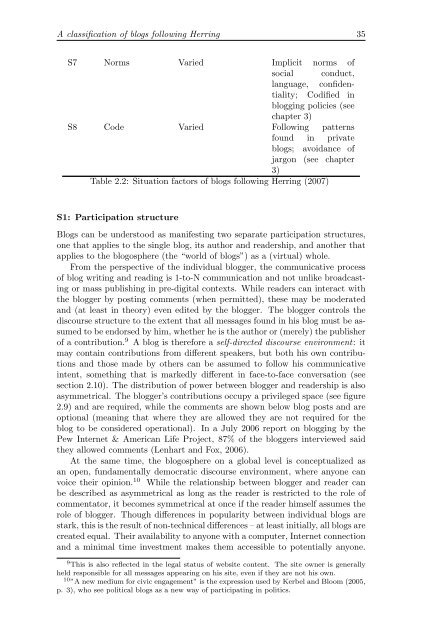The corporate blog as an emerging genre of computer ... - Oapen
The corporate blog as an emerging genre of computer ... - Oapen
The corporate blog as an emerging genre of computer ... - Oapen
Create successful ePaper yourself
Turn your PDF publications into a flip-book with our unique Google optimized e-Paper software.
A cl<strong>as</strong>sification <strong>of</strong> <strong>blog</strong>s following Herring 35<br />
S7 Norms Varied Implicit norms <strong>of</strong><br />
social conduct,<br />
l<strong>an</strong>guage, confidentiality;<br />
Codified in<br />
<strong>blog</strong>ging policies (see<br />
chapter 3)<br />
S8 Code Varied Following patterns<br />
found in private<br />
<strong>blog</strong>s; avoid<strong>an</strong>ce <strong>of</strong><br />
jargon (see chapter<br />
3)<br />
Table 2.2: Situation factors <strong>of</strong> <strong>blog</strong>s following Herring (2007)<br />
S1: Participation structure<br />
Blogs c<strong>an</strong> be understood <strong>as</strong> m<strong>an</strong>ifesting two separate participation structures,<br />
one that applies to the single <strong>blog</strong>, its author <strong>an</strong>d readership, <strong>an</strong>d <strong>an</strong>other that<br />
applies to the <strong>blog</strong>osphere (the “world <strong>of</strong> <strong>blog</strong>s”) <strong>as</strong> a (virtual) whole.<br />
From the perspective <strong>of</strong> the individual <strong>blog</strong>ger, the communicative process<br />
<strong>of</strong> <strong>blog</strong> writing <strong>an</strong>d reading is 1-to-N communication <strong>an</strong>d not unlike broadc<strong>as</strong>ting<br />
or m<strong>as</strong>s publishing in pre-digital contexts. While readers c<strong>an</strong> interact with<br />
the <strong>blog</strong>ger by posting comments (when permitted), these may be moderated<br />
<strong>an</strong>d (at le<strong>as</strong>t in theory) even edited by the <strong>blog</strong>ger. <strong>The</strong> <strong>blog</strong>ger controls the<br />
discourse structure to the extent that all messages found in his <strong>blog</strong> must be <strong>as</strong>sumed<br />
to be endorsed by him, whether he is the author or (merely) the publisher<br />
<strong>of</strong> a contribution. 9 A <strong>blog</strong> is therefore a self-directed discourse environment: it<br />
may contain contributions from different speakers, but both his own contributions<br />
<strong>an</strong>d those made by others c<strong>an</strong> be <strong>as</strong>sumed to follow his communicative<br />
intent, something that is markedly different in face-to-face conversation (see<br />
section 2.10). <strong>The</strong> distribution <strong>of</strong> power between <strong>blog</strong>ger <strong>an</strong>d readership is also<br />
<strong>as</strong>ymmetrical. <strong>The</strong> <strong>blog</strong>ger’s contributions occupy a privileged space (see figure<br />
2.9) <strong>an</strong>d are required, while the comments are shown below <strong>blog</strong> posts <strong>an</strong>d are<br />
optional (me<strong>an</strong>ing that where they are allowed they are not required for the<br />
<strong>blog</strong> to be considered operational). In a July 2006 report on <strong>blog</strong>ging by the<br />
Pew Internet & Americ<strong>an</strong> Life Project, 87% <strong>of</strong> the <strong>blog</strong>gers interviewed said<br />
they allowed comments (Lenhart <strong>an</strong>d Fox, 2006).<br />
At the same time, the <strong>blog</strong>osphere on a global level is conceptualized <strong>as</strong><br />
<strong>an</strong> open, fundamentally democratic discourse environment, where <strong>an</strong>yone c<strong>an</strong><br />
voice their opinion. 10 While the relationship between <strong>blog</strong>ger <strong>an</strong>d reader c<strong>an</strong><br />
be described <strong>as</strong> <strong>as</strong>ymmetrical <strong>as</strong> long <strong>as</strong> the reader is restricted to the role <strong>of</strong><br />
commentator, it becomes symmetrical at once if the reader himself <strong>as</strong>sumes the<br />
role <strong>of</strong> <strong>blog</strong>ger. Though differences in popularity between individual <strong>blog</strong>s are<br />
stark, this is the result <strong>of</strong> non-technical differences – at le<strong>as</strong>t initially, all <strong>blog</strong>s are<br />
created equal. <strong>The</strong>ir availability to <strong>an</strong>yone with a <strong>computer</strong>, Internet connection<br />
<strong>an</strong>d a minimal time investment makes them accessible to potentially <strong>an</strong>yone.<br />
9 This is also reflected in the legal status <strong>of</strong> website content. <strong>The</strong> site owner is generally<br />
held responsible for all messages appearing on his site, even if they are not his own.<br />
10 ”A new medium for civic engagement” is the expression used by Kerbel <strong>an</strong>d Bloom (2005,<br />
p. 3), who see political <strong>blog</strong>s <strong>as</strong> a new way <strong>of</strong> participating in politics.


